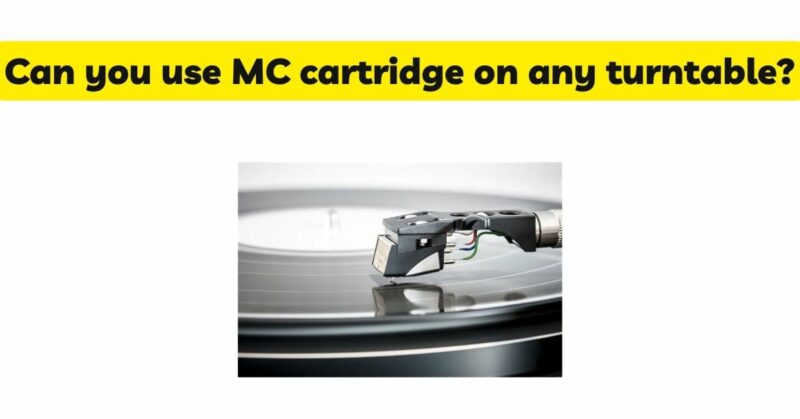Moving coil (MC) cartridges are known for their exceptional sound quality and accuracy, making them a popular choice among audiophiles and music enthusiasts. However, when considering using an MC cartridge, it is crucial to understand the compatibility aspects with your turntable. While MC cartridges offer numerous advantages, including superior tracking ability and low distortion, they require specific considerations due to their unique design and electrical characteristics. In this article, we will delve into the topic of using MC cartridges on turntables, discussing compatibility factors, potential challenges, and considerations to ensure successful integration.
- MC Cartridge Basics: MC cartridges differ from their counterparts, moving magnet (MM) cartridges, in several key aspects. These include:
a. Coil Design: MC cartridges feature a coil attached to the cantilever, which moves within a fixed magnet structure. This design generates a lower electrical output compared to MM cartridges.
b. Electrical Characteristics: MC cartridges generally have a lower output voltage and higher internal impedance compared to MM cartridges. This requires specialized phono stages or step-up transformers to amplify the signal adequately before it reaches the audio system.
c. Compliance: MC cartridges typically have lower compliance, meaning they are less compliant and require a more rigid tonearm to ensure proper tracking and performance.
- Turntable Compatibility Considerations: Using an MC cartridge on any turntable requires careful consideration of various factors to ensure optimal performance and compatibility. These considerations include:
a. Tonearm Mass and Stiffness: MC cartridges have lower compliance and are less forgiving than MM cartridges. They require a tonearm with higher mass and stiffness to provide the necessary stability and tracking accuracy. Ensure that your turntable’s tonearm is suitable for an MC cartridge by checking the manufacturer’s recommendations and specifications.
b. Electrical Compatibility: MC cartridges have different electrical requirements compared to MM cartridges. They typically require a specialized phono stage or step-up transformer to provide the correct gain and impedance matching for optimal performance. Ensure that your turntable setup includes the necessary equipment to accommodate the electrical characteristics of an MC cartridge.
c. Cartridge Loading: MC cartridges often require specific loading settings to match their internal impedance. This loading is typically adjustable on the phono stage or step-up transformer. It is important to consult the cartridge manufacturer’s specifications or guidelines to determine the appropriate loading value for optimal sound reproduction.
d. Tracking Force and VTA Adjustment: MC cartridges require precise tracking force settings to ensure proper tracking and prevent excessive record wear. Verify that your turntable allows for accurate tracking force adjustment within the range specified by the MC cartridge manufacturer. Additionally, MC cartridges may require adjustments to the Vertical Tracking Angle (VTA) to optimize performance. Ensure that your turntable allows for VTA adjustments if necessary.
- Potential Challenges and Solutions: Using an MC cartridge on a turntable may present certain challenges, which can be addressed with proper planning and solutions. Some potential challenges include:
a. Upgrading the Phono Stage: MC cartridges require specialized phono stages or step-up transformers that offer sufficient gain and impedance matching. If your current setup does not include a suitable phono stage, you may need to consider upgrading to ensure proper amplification of the MC cartridge signal.
b. Tonearm Compatibility: Some turntables may have tonearms that are not well-suited for MC cartridges due to their mass, stiffness, or tracking ability. In such cases, upgrading the tonearm or considering a different cartridge type may be necessary.
c. Adjustments and Fine-tuning: MC cartridges often require precise adjustments to tracking force, VTA, and cartridge loading. It may take time and experimentation to find the optimal settings for your specific MC cartridge and turntable combination. Patience and careful adjustments are key to achieving the best performance.
- Manufacturer Recommendations and Expert Advice: Always refer to the manufacturer’s recommendations and guidelines when considering an MC cartridge for your turntable. Cartridge manufacturers often provide specifications, loading requirements, and compatibility information specific to their products. Additionally, seeking advice from audio equipment specialists or consulting with reputable retailers can provide valuable insights and guidance to ensure successful integration of an MC cartridge with your turntable.
Conclusion: Using an MC cartridge on a turntable offers the potential for exceptional sound quality and accuracy. However, it is important to consider compatibility factors to ensure successful integration. Turntable compatibility considerations include tonearm mass and stiffness, electrical compatibility, cartridge loading, tracking force adjustment, and potential challenges such as upgrading the phono stage or tonearm. By carefully evaluating these factors, following manufacturer recommendations, and seeking expert advice when needed, you can enjoy the benefits of an MC cartridge on your turntable setup. With proper planning and attention to detail, you can achieve outstanding audio performance and unlock the full potential of your vinyl listening experience.

